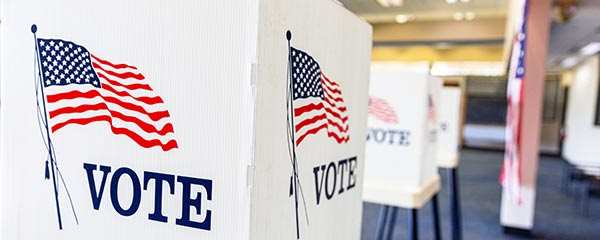PRINCETON, NJ -- A record-low 26% of Americans favor a legal ban on the possession of handguns in the United States other than by police and other authorized people. When Gallup first asked Americans this question in 1959, 60% favored banning handguns. But since 1975, the majority of Americans have opposed such a measure, with opposition around 70% in recent years.
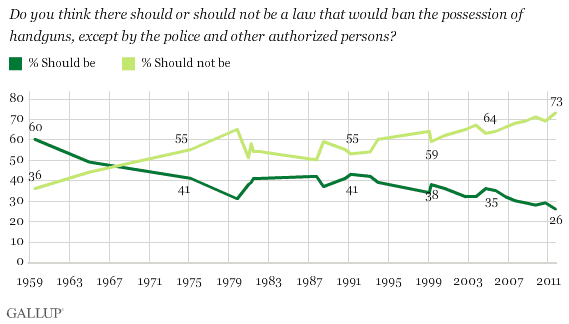
The results are based on Gallup's annual Crime poll, conducted Oct. 6-9. This year's poll finds support for a variety of gun-control measures at historical lows, including the ban on handguns, which is Gallup's longest continuing gun-control trend.
For the first time, Gallup finds greater opposition to than support for a ban on semiautomatic guns or assault rifles, 53% to 43%. In the initial asking of this question in 1996, the numbers were nearly reversed, with 57% for and 42% against an assault rifle ban. Congress passed such a ban in 1994, but the law expired when Congress did not act to renew it in 2004. Around the time the law expired, Americans were about evenly divided in their views.
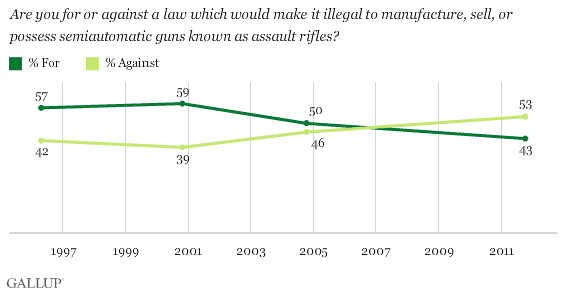
Additionally, support for the broader concept of making gun laws "more strict" is at its lowest by one percentage point (43%). Forty-four percent prefer that gun laws be kept as they are now, while 11% favor less strict laws.
As recently as 2007, a majority of Americans still favored stricter laws, which had been the dominant view since Gallup first asked the question in 1990.
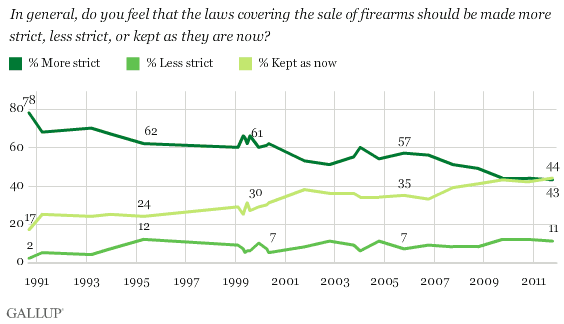
Americans' preference regarding gun laws is generally that the government enforce existing laws more strictly and not pass new laws (60%) rather than pass new gun laws in addition to stricter enforcement of existing laws (35%). That has been the public's view since Gallup first asked the question in 2000; the 60% this year who want stricter enforcement but no new laws is tied for the high in the trend.
![2000-2011 trend: In terms of gun laws in the United States, which of the following would you prefer to see happen -- [ROTATE: enforce the current gun laws more strictly and NOT pass new gun laws (or) pass new gun laws in addition to enforcing the current laws more strictly]?](http://content.gallup.com/origin/gallupinc/GallupSpaces/Production/Cms/POLL/6zs-amjn3ewpxcusqetbrg.gif)
Support for Stricter Gun Laws Down Among Key Subgroups
All key subgroups show less support for stricter gun laws, and for a ban on handguns, than they did 20 years ago. In 1991, 68% of Americans favored stricter gun laws and 43% favored a ban on handguns. Those percentages are 43% and 26%, respectively, today.
Relatively few key subgroups favor stricter gun-control laws today, whereas in 1991, all did. Since then, Democrats' views have shown less change, with a 10-point decline in the percentage favoring stricter laws. Republicans show a much larger decline of 35 points. In addition to Democrats, majorities of Eastern residents and those without guns in their household still favor stricter gun laws.
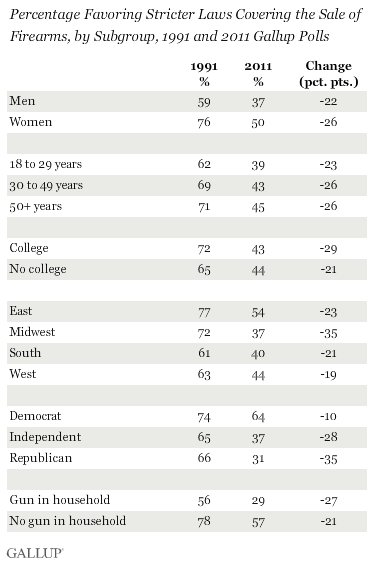
Democrats, Eastern residents, members of gun non-owning households, and women were among the few subgroups to favor a ban on handguns in 1991, but now no key subgroup has a majority in favor. Those with guns in their household are least likely to favor a handgun ban.
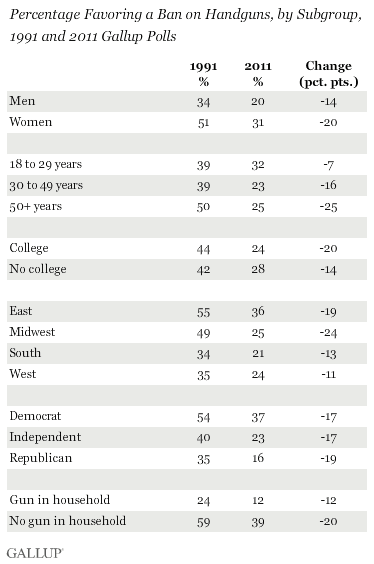
Implications
Americans have shifted to a more pro-gun view on gun laws, particularly in recent years, with record-low support for a ban on handguns, an assault rifle ban, and stricter gun laws in general. This is the case even as high-profile incidents of gun violence continue in the United States, such as the January shootings at a meeting for U.S. Rep. Gabrielle Giffords in Arizona.
The reasons for the shift do not appear related to reactions to the crime situation, as Gallup's Crime poll shows no major shifts in the trends in Americans' perceptions of crime, fear of crime, or reports of being victimized by crime in recent years. Nor does it appear to be tied to an increase in gun ownership, which has been around 40% since 2000, though it is a slightly higher 45% in this year's update. The 2011 updates on these trends will appear on Gallup.com in the coming days.
Perhaps the trends are a reflection of the American public's acceptance of guns. In 2008, Gallup found widespread agreement with the idea that the Second Amendment of the U.S. Constitution guarantees the right of Americans to own guns. Americans may also be moving toward more libertarian views in some areas, one example of which is greater support for legalizing marijuana use. Diminished support for gun-control laws may also be tied to the lack of major gun-control legislation efforts in Congress in recent years.
Survey Methods
Results for this Gallup poll are based on telephone interviews conducted Oct. 6-9, 2011, with a random sample of 1,005 adults, aged 18 and older, living in all 50 U.S. states and the District of Columbia.
For results based on the total sample of national adults, one can say with 95% confidence that the maximum margin of sampling error is ±4 percentage points.
Interviews are conducted with respondents on landline telephones and cellular phones, with interviews conducted in Spanish for respondents who are primarily Spanish-speaking. Each sample includes a minimum quota of 400 cell phone respondents and 600 landline respondents per 1,000 national adults, with additional minimum quotas among landline respondents by region. Landline telephone numbers are chosen at random among listed telephone numbers. Cell phone numbers are selected using random-digit-dial methods. Landline respondents are chosen at random within each household on the basis of which member had the most recent birthday.
Samples are weighted by gender, age, race, Hispanic ethnicity, education, region, adults in the household, and phone status (cell phone only/landline only/both, cell phone mostly, and having an unlisted landline number). Demographic weighting targets are based on the March 2010 Current Population Survey figures for the aged 18 and older non-institutionalized population living in U.S. telephone households. All reported margins of sampling error include the computed design effects for weighting and sample design.
In addition to sampling error, question wording and practical difficulties in conducting surveys can introduce error or bias into the findings of public opinion polls.
View methodology, full question results, and trend data.
For more details on Gallup's polling methodology, visit www.gallup.com.
